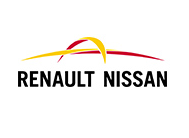The Renault-Nissan Alliance reports that it delivered significant growth in 2016, with global sales of 9.96 million vehicles and nearly 425,000 electric vehicles (EVs) since the introduction of the Nissan LEAF in 2010, followed by the Renault ZOE.
As reported, the alliance sales figures include Mitsubishi Motors sales of 934,013 vehicles globally. Mitsubishi Motors joined the alliance last fall with Nissan’s acquisition of a 34% equity stake in the company.
“The combination of Groupe Renault, Nissan Motors and Mitsubishi Motors creates a new force in the global auto industry,” says Chairman and CEO Carlos Ghosn. “The strength of this innovative partnership that began 18 years ago has allowed us to improve our competitiveness, boost our growth and engage in the race for the vehicle of the future.”
Notably, the alliance brands accounted for about one in nine cars sold worldwide last year.
The Nissan LEAF, the first mainstream, mass-marketed EV, remains the world’s best-selling EV, with more than 250,000 vehicles sold since its launch in December 2010. In addition to the LEAF, Nissan also sells the e-NV200, a light commercial vehicle that has been sold mainly in Europe and Japan since 2014.
Renault has sold more than 112,000 EVs worldwide since 2011, including the Renault ZOE, Kangoo Z.E., Fluence Z.E., SM3 Z.E. and Twizy.
Renault was at the top of the European EV market last year, with sales up by 11% at 25,648 units (excluding Twizy). ZOE led the EV ranking, with 21,735 sold. Renault Pro+ recently announced the addition of two new commercial EVs to its lineup: the New Kangoo Z.E. and Master Z.E.
In 2016, the Renault-Nissan Alliance, including the Mitsubishi Motors i-Miev series, sold 94,265 EVs – up more than 8% from 2015.
The alliance plans to launch at least 10 models with autonomous drive functionality by 2020. Development and tests of connectivity and autonomous drive technologies are under way with several partners, including Microsoft and NASA.
“We were the first to launch an affordable electric car back in 2010. Other major automakers are now recognizing that EVs are the most effective zero-emission solution,” Ghosn says. “With autonomous drive and connected cars and services, we are firmly engaged in the race for the vehicle of the future.”





